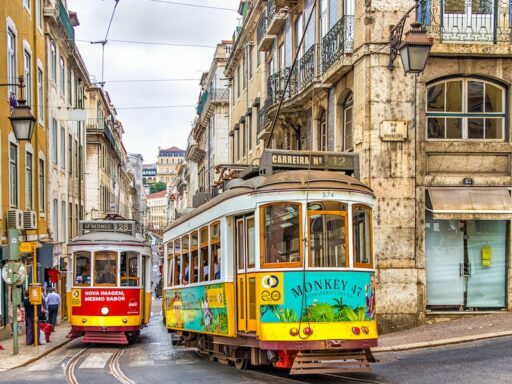When you think of the ideal retirement destination, Portugal often tops the list. Many people choose to retire in Portugal because of its alluring lifestyle and affordable cost of living compared to other European countries.
If you have any questions or want to invest as an expat or high-net-worth individual, you can email me (advice@adamfayed.com) or use these contact options.
Portugal as a Popular Retirement Destination
The decision to retire in Portugal isn’t just a fleeting trend. The Portuguese lifestyle, with its rich culture, delicious cuisine, and stunning landscapes, draws retirees from all over the world.
When you retire in Portugal, you immerse yourself in a country that values tradition, family, and relaxation.
Moreover, when you compare the cost of living in Portugal to other European nations, you quickly realize the financial advantages of choosing this beautiful country for your golden years.
Practical Information about Portugal
Portugal, officially known as República Portuguesa, is a unitary semi-presidential constitutional republic with a temperate maritime climate. The capital city is Lisbon, and the official language is Portuguese.
The currency used is the Euro (EUR, €). Portugal is divided into 18 districts, each with its own municipalities. It’s essential to carry your ID with you at all times in Portugal, as you might need to present it to the authorities upon request.
Cost of Living in Portugal
The cost of living in Portugal varies depending on the region. Cities like Lisbon and Cascais are among the most expensive, while places like Braga, Viseu, and Coimbra are more affordable.
For instance, rent for a one-bedroom apartment in Lisbon can be around 1,100 EUR, while in Viseu, it’s approximately 400 EUR. Utility costs, including electricity, gas, water, and internet, average around 130 EUR per month.

Groceries are reasonably priced, with essential items like bread, milk, and eggs costing around 1.10 EUR, 0.60 EUR, and 1.70 EUR, respectively.
Transportation in Portugal
Public transportation in Portugal is extensive in major cities. Buses are widely available, and in cities like Porto and Lisbon, there’s a metro system. The metro is reliable and offers an escape from the usual traffic jams during rush hours.
Trains, operated by Comboios de Portugal (CP), connect various cities, with the Alfa Pendular line being the most extensive. Taxis are also available, with fares starting at around 3 EUR.
Apps like Uber and Bolt offer alternative transportation options in bigger cities.
Portuguese Culture and Social Etiquette
The Portuguese place a high value on family ties. Young people often live with their parents until their late twenties or even thirties, primarily due to financial reasons and the comfort of home-cooked meals and clean laundry.
Religion plays a significant role in the upbringing of most Portuguese, with up to 80% of the population identifying as Catholic. However, a recent study indicates a shift in religious beliefs among the younger generation.
The Portuguese are friendly and welcoming, making it easier for expats to adjust. Learning the language can further enhance the assimilation process.
Dining Etiquette in Portugal
When dining in Portugal, it’s customary to follow continental table manners, with the fork in the left hand and the knife in the right.
The host usually signals the start of the meal, so it’s polite to wait for them. If invited to someone’s home, it’s a kind gesture to bring a small gift, such as wine or chocolates.
Portuguese cuisine is a delightful blend of Mediterranean flavors, with olive oil, potatoes, rice, meat, and fish being staple ingredients. The Portuguese typically have four meals a day, and dinner is usually later in the evening compared to other European countries.
Understanding the Portuguese Residency Options
When you decide to retire in Portugal, it’s essential to get acquainted with the available residency options. Portugal offers two primary programs for those considering retirement in the country: the Non-Habitual Residency (NHR) program and the Golden Visa Program.
The Non-Habitual Residency (NHR) program
Introduced in 2009 and updated in 2020, the NHR program is a tax regime designed to attract foreign residents and investors to Portugal. This program has successfully drawn over 10,000 non-habitual residents to enjoy its benefits.
Advantages of the NHR Program
- Special individual tax treatment on incomes for a period of 10 years.
- Tax exemption on almost all foreign sources of income.
- Compared to other Portuguese income tax rates that can reach up to 48%, the NHR program offers a 20% flat rate on certain Portuguese-source incomes, specifically from qualifying professions and self-employment.
- Opportunity to establish tax residency within the EU in a white-listed country.
- Exemption of tax on gifts or inheritance to direct family members.
- No wealth tax and free cash remittance to Portugal.
Eligibility for the NHR Program
To qualify for the NHR program, you must:
- Have the right to be a resident in Portugal, either as an EU/EEA/Swiss citizen or through the Portugal Golden Visa Program.
- Not have been a Portuguese tax resident in the preceding five years.
- Establish a tax resident status in Portugal by holding a place of abode by the 31st of December of the year, indicating your intention for Portugal to be your habitual home. This can be demonstrated through a Portuguese property purchase deed or a 12-month rental contract.
The Golden Visa Program
For those aiming to retire in Portugal, the Golden Visa Program presents another attractive option. This program is essentially a residency-by-investment scheme, granting individuals the right to live and work in Portugal.
Benefits of the Golden Visa Program
- By making a qualifying investment in the country, you can secure your path to residency and even citizenship.
- The program not only allows you to retire in Portugal but also grants you the freedom to travel across the European Union.
- Individuals who secure residency through the Golden Visa Program can also apply for the NHR program, combining the benefits of both.
Professions Regarded as High Added Value
Certain professions are deemed of high added value to Portugal, mainly due to their economic and cultural significance.
Individuals practicing these professions receive generous tax exemptions. Some of these professions include General Managers, Executive Managers, Medicine Doctors, University Teachers, ICT Technologists, Authors, Journalists, and many more.
These professionals should hold specific qualifications or have at least five years of proven professional experience.
Tax Implications to Retire in Portugal
Under the NHR regime, most foreign source income is exempt from taxation in Portugal for ten consecutive years.
This means if the income comes from a source that has a Double Taxation Agreement (DTA) with Portugal, then it won’t be subject to taxation in Portugal.

The Portuguese Healthcare System
Healthcare remains a primary concern for many looking to retire in Portugal. The good news is that Portugal offers an excellent healthcare system, ensuring both citizens and legal residents receive quality medical care.
Public vs. Private Healthcare in Portugal
When planning to retire in Portugal, you’ll face the decision between opting for public or private healthcare. Both systems have their merits, and understanding them can help you make an informed choice.
The Public Healthcare System: Serviço Nacional de Saúde (SNS)
Portugal’s public healthcare system, managed by the Serviço Nacional de Saúde (SNS), provides state-provided healthcare, which is free for all citizens and legal residents.
While medical care is primarily free, there might be some fees when visiting emergency rooms, family doctors, or requesting ambulance services, typically ranging from 5 to 20 EUR.
Public healthcare in Portugal covers almost all medical procedures, excluding dental care and cosmetic surgery. The country has numerous public hospitals and local health centers, ensuring primary medical care is accessible to all.
Registering for Public Healthcare
To access state medical services, you first need to register with your local council (junta de freguesia). After obtaining proof of address, you’ll register with the local healthcare center (centro de saúde).
Once registered, you’ll receive a healthcare number, Número de Utente, essential for accessing public healthcare services.
Private Healthcare in Portugal
Private health insurance in Portugal offers an alternative, especially considering the longer waiting times in the public system for elective procedures.
With private healthcare, you have a broader choice of doctors and quicker access to specialists. The cost of private insurance varies, generally ranging between 20 and 50 EUR per month, depending on age and coverage extent.
Key Facts about Healthcare in Portugal
- Portugal offers both public and private medical healthcare.
- Life expectancy in Portugal stands at around 81 years, higher than the EU average.
- The Portuguese government’s spending on public healthcare is less than other European countries, leading to increasing out-of-pocket expenses.
- Major health concerns in Portugal include cardiovascular diseases, cancer, smoking, drinking, and obesity.
Costs and Waiting Times
While the public healthcare system is mostly free, there are instances where you might incur some charges. For example:
- General Practitioner: 4.50 EUR
- Specialist: 7 EUR
- House visit: 9 EUR
- Infirmary services (hospitals): 4.50 EUR
- Infirmary services (local health centers): 3.50 EUR
However, one of the challenges of the public healthcare system is the waiting times. Most patients relying on public healthcare wait over a year for a first consultation. For specialties like ophthalmology, waiting times average two years.
Giving Birth in Portugal
For those considering starting a family as they retire in Portugal, the country offers comprehensive maternity care. Legal residents receive free maternity appointments, and both childbirth methods, C-sections or natural childbirth, are free of charge.
Child Citizenship
A child born in Portugal automatically becomes a Portuguese citizen if either parent was born in Portugal and resides there during the birth.
If neither parent was born in Portugal, the child can acquire Portuguese nationality when one parent completes five years of residence or when the child completes the first cycle of basic education in Portugal.
Embracing the Portuguese Lifestyle
To fully enjoy your decision to retire in Portugal, embracing the local lifestyle is essential. From mastering the language to actively participating in community events, every effort you make will enhance your experience in this beautiful country.
Learning the language
While many in Portugal speak English, especially in major cities like Lisbon and Porto, understanding and speaking Portuguese will undoubtedly enrich your experience.
Why learn Portuguese?
More than 260 million people globally speak Portuguese, making it the ninth most spoken language. In Portugal, 95.6% of the population speaks Portuguese as their native or second language.
Although many locals in the main cities speak English, having a basic understanding of Portuguese proves beneficial in the long run. It not only opens up job opportunities but also allows you to engage deeply with the local culture, from watching local TV shows to enjoying soulful fado music.
Resources to learn Portuguese
- Language Schools in Portugal: Institutions like the Cambridge School and Portuguese Connection offer structured courses for all levels.
- Online Platforms: Websites like Instituto Camões and Preply provide online courses and tutor matching services.
- Apps: Mobile applications such as Babbel, Drops, and Memrise offer interactive lessons and exercises to help you grasp the language at your own pace.
Integrating into the local community
To retire in Portugal means more than just residing there. It’s about becoming a part of the community, understanding their traditions, and immersing yourself in their way of life.

Engaging in Local Activities
Find a hobby or activity you love, such as sports, crafts, or music, and connect with locals who share your interests. Watching local TV programs or listening to Portuguese music can also help you pick up informal expressions and understand cultural nuances.
Joining Expat and Language Exchange Groups
Platforms like Meetup offer various groups where you can meet both locals and expats. Engaging in language exchange programs, where you teach someone English while they teach you Portuguese, can be both educational and fun. It’s a great way to practice the language and make friends.
Participating in Local Traditions
Portugal boasts a rich tapestry of traditions and festivals. Whether it’s the lively Carnival, the serene Holy Week processions, or the traditional Fado music nights, participating in these events will give you a genuine feel of the Portuguese spirit.
Real Estate and Housing Options
When you decide to retire in Portugal, finding the right home becomes a pivotal decision. The Portuguese real estate market offers a myriad of options, catering to various preferences and budgets.
Buying vs. renting in Portugal
Choosing between buying and renting is a significant decision when you retire in Portugal. Buying provides a sense of permanence and can be an investment while renting offers flexibility, especially if you’re unsure about settling in one place.
Market Overview
Portugal’s real estate market has witnessed a surge in foreign investment, making up roughly 20% of Portuguese property transactions annually.
With market prices significantly lower than many European counterparts, Portugal stands out as a top choice for foreign real estate investment.
On average, property prices range between €1,000 and €3,500 per square meter in rural areas. In contrast, urban areas can go up to €5,500/sq. m.
Benefits for Non-residents
There are no special restrictions on foreign investment in Portuguese real estate. In fact, the Portuguese government encourages third country (non-EU) investors through the Golden Visa scheme.
This scheme offers residency to those who purchase eligible properties above a certain value. After owning a property in Portugal for over five years, one can even gain permanent residency and EU citizenship.
Legal considerations when purchasing property
When you decide to buy property as you retire in Portugal, understanding the local laws is crucial.
Transaction Costs
- Transfer Tax: Ranges from 1.00% to 8.00%, paid by the buyer.
- Registration fee: Between 0.20% and 1.20%, paid by the buyer.
- Stamp Duty: A flat rate of 0.80%, paid by the buyer.
- Legal Fees: Typically between 1.00% and 2%, paid by the buyer.
- Real Estate Agent’s Fee: Between 3% and 6%, usually covered by the seller.
Property Taxes
All property owners must pay an annual Property Tax, or IMI (Imposto Municipal sobre Imóveis). Rates vary by municipality, with 0.8% of the property value in rural areas and between 0.3% and 0.45% in urban areas.

If you plan to reside in or rent out your property, you might qualify for a Property Tax exemption for up to three years. Properties set for renovation may benefit from up to a five-year exemption. However, rental profits face a fixed tax of 15% of rental income.
Additionally, properties worth over €600,000 are subject to Wealth Tax, or AIMI (Adicional Imposto Municipal Sobre Imóveis).
Steps to Buy Property in Portugal
- Acquire a Portuguese Tax Number (NIF – Número de Identificação Fiscal).
- Employ a lawyer to assist with contracts and legalities.
- Provide a reservation fee (between €6,000 and €20,000) to secure the property.
- Sign a Sale Contract (Contrato de Promessa de Compra e Venda) after agreeing on a price.
- Finalize the sale by signing the Property Deed (Escritura Pública de Compra e Venda).
- Provide a deposit of at least 20 – 30% of the sale price.
Pained by financial indecision?

Adam is an internationally recognised author on financial matters with over 830million answer views on Quora, a widely sold book on Amazon, and a contributor on Forbes.



